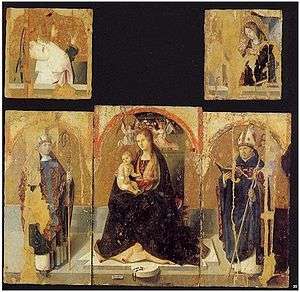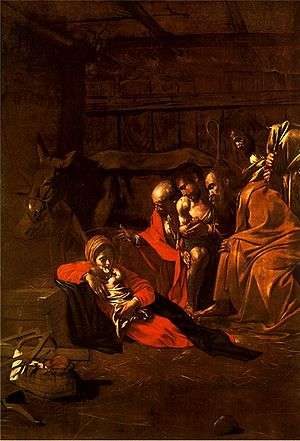Interdisciplinary Regional Museum of Messina
The Interdisciplinary Regional Museum of Messina (Italian - Museo regionale interdisciplinare di Messina[1]) is a museum of painting, sculpture and archaeology in the city of Messina. Until 2017 it was housed in the former Barbera-Mellinghoff silk-mill, a late 19th century building chosen for it after the 1908 Messina earthquake. Since 2017 it has been housed in a nearby complex designed in the 1970s.
History
Origins

The first nucleus for the museum's collection came with various private collections of conservative taste. First opened in 1806 as the Museo civico peloritano by the Reale Accademia Peloritana "to end the despoliation of art", its formation was the idea of its first director Carmelo La Farina. It housed the Alojsio, Arenaprimo, Ciancialo, Grosso-Cacopardo and Carmisino family collections as well as a collection of 14th to 18th century paintings owned by the city's senate, which also part-funded its running costs.
It was initially based on via Rovere, near the Archivio degli atti notarili, before being moved to former university buildings, then (after its massive expansion from the collections of religious corporations suppressed by the 1866 liquidation laws) in 1884 to a building on via Peculio Frumentario and from 1891 to 1908 to the former monastery of San Gregorio.
Earthquake and recovery
The rebuilding plans were cut short by the 1908 earthquake, in which the museum collapsed and some artworks were lost.
Nationalisation
1939 plan
Post-war restoration
1956 and 1961 plans
1960s plans
1970s plans
In 1977 responsibility for the museum passed to the Regione Siciliana and it took on its present name. In 1984 it was rearranged chronologically.[2]
Basile-Manganaro plan
Completion
Collections
The museum illustrates the course of figurative art in Messina from the 12th to 18th centuries, including paintings, sculptures and decorative art in chronological sequence. Their artists include Antonello da Messina, Mattia Preti, Caravaggio, Girolamo Alibrandi, Vincenzo Catena, Annibale Carracci and Francesco Laurana.
From the precious cathedral treasury come the 'flowering branch' in gold, enamel, pearls and emeralds from a late 17th century goldsmith in the city, though only the early 14th and 17th century Sicilian jewels from the two crowns of the sacred images are displayed.
Marble work
Inlays
Woodwork
Church furniture
Paintings
- Adoration of the Shepherds
- Raising of Lazarus
- San Gregorio Altarpiece
- Madonna and Child with a Franciscan
- Deposition
- Madonna of the Letter
- The Widow of Nain
- Beheading of St John the Baptist
- Circumcision of Christ
- Madonna of the Rosary
Antonello de Saliba
- Madonna with Jasmine
- St Dominica
- St Catherine of Alexandria
- Last Judgement
- Madonna dell'Itria (Our Lady of the Way)
The Goddess Calypso Welcoming Telemachus
Cupid and Psyche
Orion, Founder of Messina The Nymphs Lapizia and Fetusa Receiving the First Hare Killed by Orion
Foundation of the Compagnia dei verdi
L'Addolorata
Mary Magdalene at Christ's Feet
Nativity of the Virgin
Embassy of the citizens of Messina to the Virgin Mary
Matthias Stomer
Mucius Scaevola in the Presence of Lars Porsena
Adoration of the Shepherds
- Girolamo Alibrandi, Last Judgement
 Mario Minniti - The Widow of Nain
Mario Minniti - The Widow of Nain- Caravaggio, Raising of Lazarus

- Antonello da Messina, San Gregorio Altarpiece
- Antonello da messina, Madonna and Child with a Franciscan
 Mattia Preti, Madonna of the Letter
Mattia Preti, Madonna of the Letter
Sculptures
- Aedicula
- Madonna and Child
- Madonna of the Angels
- Holy Trinity
- Fontana del Nettuno (original)
- Madonna and Child
Goro di Gregorio
- Madonna degli Storpi (Madonna of the Cripples)
Rinaldo Bonanno
- Marchesi-Barresi funerary monument
Antonello Freri
- Balsamo monument
Martino Montanini
Victory or Peace and Bravery
- Annunciation
 Madonna and Child, Francesco Laurana
Madonna and Child, Francesco Laurana Madonna and Child, Antonello Gagini
Madonna and Child, Antonello Gagini Madonna degli storpi, Goro di Gregorio
Madonna degli storpi, Goro di Gregorio Faith
Faith Hope
Hope- Stylophorus Lion
- Pelican lectern, 16th century
 Marchesi-Barresi funerary monument, Rinaldo Bonanno
Marchesi-Barresi funerary monument, Rinaldo Bonanno
 Sarcophagus of Luca I Archimandrita, 1175
Sarcophagus of Luca I Archimandrita, 1175
 Holy Trinity, Montorsoli
Holy Trinity, Montorsoli Balsamo monument
Balsamo monument Francesca Lanza Cybo funerary monument
Francesca Lanza Cybo funerary monument Praying Virgin
Praying Virgin
References
- "Museo Regionale - Cenni storici". Archived from the original on 2011-11-16.
- BBCC Regione Siciliana
External links
- "Official site" (in Italian).